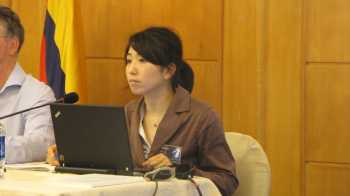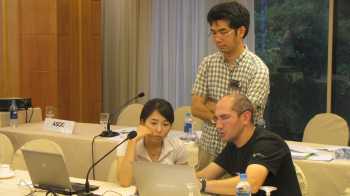An important presentation was made to delegates attending the Sixth Meeting of the ACAP Advisory Committee in Guayaquil, Ecuador yesterday by Dr Yukiko Inoue of the Japanese National Research Institute of Far Seas Fisheries (Tuna and Skipjack Resources Division).
Her talk, entitled "Distribution of seabird bycatch in the Southern Hemisphere" analysed a large data set collected by observers on Japanese research and commercial tuna longliners over the period 1992 to 2010. Over 25 million hooks from 10 500 sets were observed and 3389 seabirds were reported killed.
Most seabird mortality was of 17 species of ACAP-listed albatrosses and Macronectes and Procellaria petrels, with smaller numbers of other seabirds, such as shearwaters. The birds reported most commonly killed were Grey-headed Thalassarche chrysostoma and Black-browed T. melanophris albatrosses. "Hotspots" for seabird bycatch were in Chilean and South African waters and in the south-eastern Indian Ocean.
Dr Inoue informed the meeting that further analyses of total bycatch will be made by area, season and year for each species. Interest in her talk was high, so much so that on request she kindly repeated it later in the day to allow for a more extensive question and answer session. This is the first time a Japanese delegation is attending a meeting of ACAP's Advisory Committee.

Yukiko Inoue presents her talk on seabird bycatch by Japanese longliners

Yukiko Inoue and Daisuke Ochi discuss seabird bycatch issues with Richard Phillips
of the United Kingdom's British Antarctic Survey
Photographs by John Cooper
Reference:
Inoue, Y., Yokawa, K., Minami, H., Ochi, D., Sato, N. & Katsumata, N. 2011. Distribution of seabird bycatch at WCPFC and the neighboring area of the southern hemisphere. WCPFC-SC7-EB-WP07. 24 pp.
John Cooper, ACAP Information Officer, 1 September 2011

 English
English  Français
Français  Español
Español